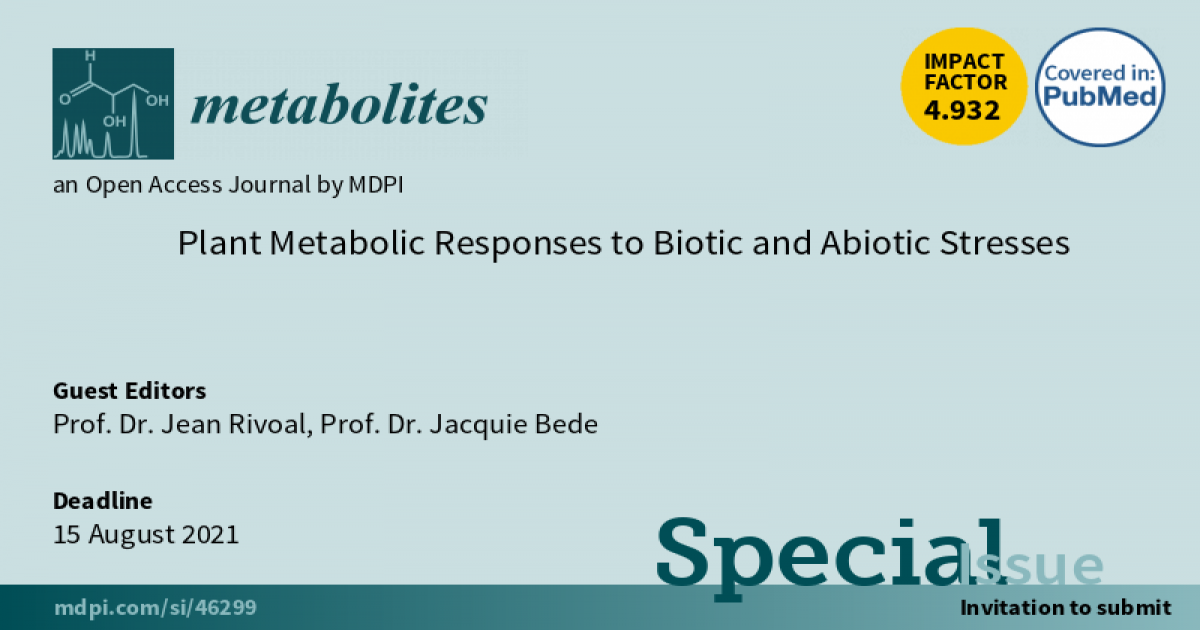Plant Metabolic Responses to Biotic and Abiotic Stresses
A special issue of Metabolites (ISSN 2218-1989).
Deadline for manuscript submissions: closed (15 August 2021) | Viewed by 33156

Special Issue Editors
Interests: plant primary metabolism; plant stress; protein redox modifications; plant respiration; targeted metabolomics
Special Issue Information
Dear Colleagues,
Biotic and abiotic factors can lead to plant stress, which limits growth and development, often negatively impacting crop productivity with the potential to affect food security. To cope with adverse environmental conditions, one of the most important plant responses is metabolic adaptation. This involves adjusting metabolic processes, allowing the plant to withstand and survive stress. This requires integrating environmental, physiological, and developmental information to modify pathways and may result in, for example, increased production of defence compounds against pathogens or pests and/or redirecting metabolic fluxes to deal with nutrient limitation. Understanding how plant adjust their metabolism to cope with stress has critical implications for the development of novel crop varieties that will be able to withstand the predicted effects of climate change on agricultural productivity. This Special Issue on “Plant Metabolic Responses to Biotic and Abiotic Stresses” highlights recent developments in our understanding of how plants modulate their metabolism in response to stress. We welcome primary research papers, as well as short or in-depth literature reviews on the topic. This Special Issue covers biotic and abiotic stresses, including, but not limited to, topics such as plant responses to nutrient limitations, elevated CO2, water stress, salinity and osmotic stresses, extreme temperatures, and response to pathogens and pests.
Prof. Dr. Jean RivoalProf. Dr. Jacquie Bede
Guest Editors
Manuscript Submission Information
Manuscripts should be submitted online at www.mdpi.com by registering and logging in to this website. Once you are registered, click here to go to the submission form. Manuscripts can be submitted until the deadline. All submissions that pass pre-check are peer-reviewed. Accepted papers will be published continuously in the journal (as soon as accepted) and will be listed together on the special issue website. Research articles, review articles as well as short communications are invited. For planned papers, a title and short abstract (about 100 words) can be sent to the Editorial Office for announcement on this website.
Submitted manuscripts should not have been published previously, nor be under consideration for publication elsewhere (except conference proceedings papers). All manuscripts are thoroughly refereed through a single-blind peer-review process. A guide for authors and other relevant information for submission of manuscripts is available on the Instructions for Authors page. Metabolites is an international peer-reviewed open access monthly journal published by MDPI.
Please visit the Instructions for Authors page before submitting a manuscript. The Article Processing Charge (APC) for publication in this open access journal is 2700 CHF (Swiss Francs). Submitted papers should be well formatted and use good English. Authors may use MDPI's English editing service prior to publication or during author revisions.
Keywords
- plant stress
- biotic stress
- abiotic stress
- metabolic adaptation
- metabolomics
- metabolic flux
- metabolic regulation
Benefits of Publishing in a Special Issue
- Ease of navigation: Grouping papers by topic helps scholars navigate broad scope journals more efficiently.
- Greater discoverability: Special Issues support the reach and impact of scientific research. Articles in Special Issues are more discoverable and cited more frequently.
- Expansion of research network: Special Issues facilitate connections among authors, fostering scientific collaborations.
- External promotion: Articles in Special Issues are often promoted through the journal's social media, increasing their visibility.
- Reprint: MDPI Books provides the opportunity to republish successful Special Issues in book format, both online and in print.
Further information on MDPI's Special Issue policies can be found here.







